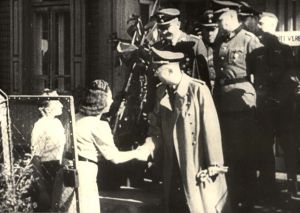Himmler visits Minsk

Himmler in Minsk - August 1941
Heinrich Himmler toured the Eastern Front and on 15 August 1941 he visited Minsk and ordered Arthur Nebe, the commander of Einsatzgruppen B, to carry out an execution in his presence of one hundred inmates of the Minsk prison. SS-
An open grave had been dug and they had to jump into this and lie face downwards. And sometimes when one or two rows had already been shot, they had to lie on top of the people who had already been shot and then they were shot from the edge of the grave. And Himmler had never seen dead people before and in his curiosity he stood right up at the edge of this open grave-
While he was looking in, Himmler had the deserved bad luck that from one or other of the people who had been shot in the head he got a splash of brains on his coat, and I think it also splashed into his face, and he went very green and pale; he wasn’t actually sick, but he was heaving and turned round and swayed and then I had to jump forward and hold him steady and then I led him away from the grave.
After the shooting was over, Himmler gathered the shooting squad in a semi-
They must be hard and stand firm. He could not relieve them of this duty; he could not spare them. In the interests of the Reich, in this hopefully Thousand Year Reich, in its first decisive great war after the take-
Sources:
M.Gilbert, The Holocaust – The Jewish Tragedy, published by Collins London 1986
G. Reitlinger, The Final Solution, Vallentine Mitchell, London 1953
Christian Ingrao, Believe and Destroy, Polity Press 2013
Robert Wistrich, Who’s Who in Nazi Germany, Routledge, London 1995
Photograph – Yad Vashem Israel
© Holocaust Historical Society 2015

